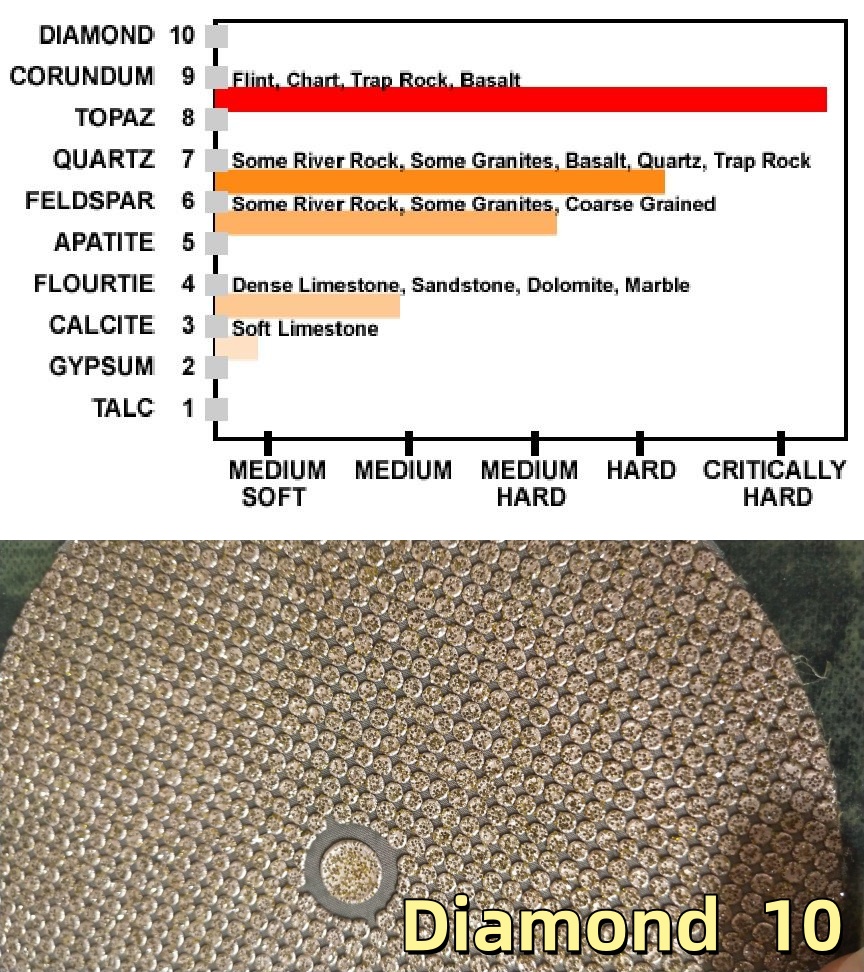The Mohs Hardness Scale is a standard used to measure a mineral's hardness, introduced by German mineralogist Friedrich Mohs in 1812. This scale ranks minerals based on their ability to scratch another, with a range from 1 to 10. Diamond, the hardest known natural material, sits at the top of this scale with a Mohs hardness of 10. This superior hardness makes diamond tools exceptionally advantageous in various manufacturing processes, particularly in cutting, grinding, and drilling.
1. The Principle and Application of Mohs Hardness
The Mohs hardness scale arranges minerals in order of their ability to scratch each other, as follows:
- Talc (1): The softest mineral, can be scratched with a fingernail.
- Gypsum (2): Can also be scratched with a fingernail.
- Calcite (3): Can be scratched with a copper coin or knife.
- Fluorite (4): Can be scratched with a steel needle.
- Apatite (5): Can be scratched but with difficulty using a knife.
- Orthoclase (6): Can be scratched with glass.
- Quartz (7): Can scratch glass.
- Topaz (8): Can scratch quartz.
- Corundum (9): Can scratch topaz.
- Diamond (10): Can scratch all other minerals.
This simple yet effective rating system finds wide use in geology, materials science, and many industrial sectors for hardness assessment.

2. Why Choose Diamond Tools
Due to its Mohs hardness of 10, diamond offers exceptional performance in numerous applications, such as:
- Efficient Cutting: Diamond blades can quickly and accurately cut through various hard materials like concrete, marble, and granite.
- Wear Resistance: Diamond tools are highly wear-resistant, offering prolonged tool life and reducing replacement costs.
- Precision: The hardness of diamond ensures machining precision, delivering excellent results in engineering design and demanding manufacturing processes.
- Versatility: Diamond tools are suitable for working on various surfaces and materials, including metals, ceramics, and glass.
3. Applications of Diamond Tools
Diamond tools find extensive applications in multiple industries:
- Construction Industry: Diamond saw blades and drill bits are indispensable in construction, especially for cutting hard structural materials.
- Stone Processing: Essential for cutting and polishing hard stones like marble and granite.
- Automotive Manufacturing: Diamond tools ensure high quality and precision in manufacturing high-precision components and molds.
- Aerospace: Capable of handling materials used in aerospace, such as composites and high-strength alloys.
4. How to Choose the Right Diamond Tool
When selecting the appropriate diamond tool, consider these key factors:
- Material to be Processed: Different materials require different specifications of diamond tools.
- Operating Conditions: The environmental conditions like humidity and temperature can influence the choice of diamond tools.
- Tool Requirements: Choose the right size and shape of the diamond tool based on specific machining needs.
5. Our Diamond Tool Advantages
As a specialized manufacturer of diamond tools, our products meet international standards in quality and performance:
- Quality Assurance: We use high-purity diamond material to ensure the quality of each tool.
- Technological Innovation: Continuously pursuing innovation to enhance cutting efficiency and tool durability.
- Customer Service: Providing expert technical support and after-sales service to ensure customer satisfaction.
We are dedicated to offering the best solutions to safeguard your work. For further inquiries or detailed information, please contact our sales team.

-All diamond tools can be ordered and fabricated!
-Henry Wang | Quote Manager
-WhatsApp:+86-18030177538
-Email: ceo@zdiamondtools.com
-Web www.zdiamondtools.com















